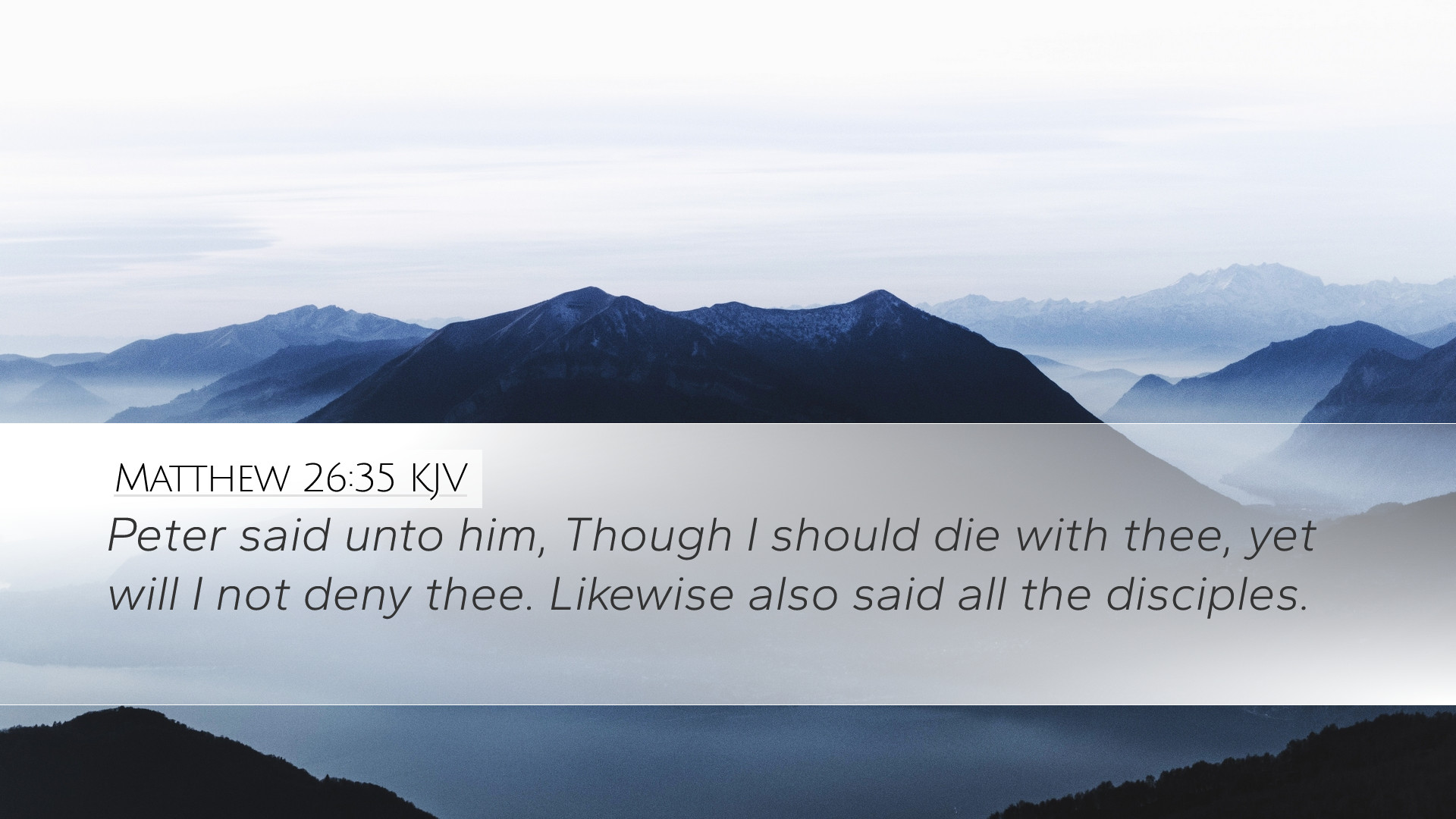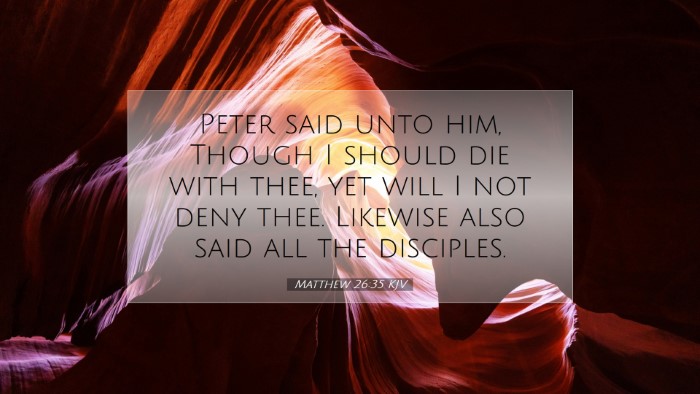Commentary on Matthew 26:35
Verse Text: "Peter said unto Him, Though I should die with thee, yet will I not deny thee. Likewise also said all the disciples."
Introduction
This verse captures the fervent promise of Peter, reflecting both the sincerity and the frailty of human resolve. The intense atmosphere of the Last Supper, the gravity of the moment, and the looming passion of Christ set the stage for this declaration. Commentators such as Matthew Henry, Albert Barnes, and Adam Clarke provide profound insights into the implications of Peter’s bold statement and the collective response of the disciples.
Contextual Analysis
In examining Matthew 26:35, it is essential to contextualize it within the events surrounding the Last Supper. This moment is charged with emotional complexity as Jesus institutes the Eucharist and foretells the betrayal. It is in this context that Peter’s declaration unfolds.
Historical Context
Both Henry and Clarke emphasize the tension between fear and faith during this crucial moment. The disciples are grappling with the reality of Jesus’ impending suffering and their own vulnerability. Jesus had revealed that one of them would betray Him, leading to a sense of foreboding. Peter's statement, though noble, reflects human tendencies to overestimate one's own steadfastness in the face of trial.
The Character of Peter
Peter, often seen as the leader among the disciples, was known for his impulsive nature. Barnes notes that Peter’s assertion mirrors a common trait of zeal without knowledge. His confidence stands in stark contrast to the truth of human frailty. This duality highlights the struggle believers face when making bold commitments to God.
Exegesis of the Text
In this verse, Peter’s declaration is made emphatically: "Though I should die with thee...". This expression underscores Peter's dramatic commitment. However, it simultaneously exposes the inherent weakness of the flesh, as highlighted by Clarke, who posits that while Peter was sincere, he was utterly unaware of the trials that awaited him.
The Use of "Though" in Peter's Statement
The word "though" introduces a conditional aspect that bears significant weight. It brings emphasis to Peter's loyalty as he is ready to face death alongside Jesus, yet it foreshadows his eventual denial. Henry comments on this paradox, asserting that the strongest vows can be made in the heat of emotion while being unable to endure in the face of real adversity.
The Collective Response of the Disciples
The latter part of the verse notes, "Likewise also said all the disciples." This collective agreement serves to highlight the general sentiment of loyalty among the group, yet it also raises questions about the accountability of their faith. Barnes points out that while all the disciples echoed Peter's pledge, their resolve, too, would be tested.
The Nature of Discipleship
This scene is rich for examining the ideals of discipleship. The disciples’ unified declaration illustrates a common human tendency to align oneself with noble intentions. However, it also reveals the dangers of presumptive faith, as Clarke warns that confidence in one’s own commitment without reliance on God can lead to failure.
Theological Implications
The implications of this verse extend into the broader narrative of the New Testament. Jesus’ foreknowledge of Peter’s denial speaks to His divinity and understanding of human nature. Henry emphasizes that Christ, aware of this impending betrayal, responds not with condemnation but with grace, exemplifying the truth that all are susceptible to weakness.
Grace in the Face of Failure
This passage invites reflection on the theme of grace and restoration. Though Peter fails to live up to his vow, the later restoration of Peter in John 21 serves as a testament to God’s unwavering love. Barnes articulates that the promise of forgiveness is a core tenet of the Christian faith, emphasizing that failures do not disqualify one from God’s purpose.
Practical Application
For pastors and theologians, this verse serves as a powerful reminder of the importance of vigilance in the Christian walk. The intensity of Peter's promise challenges contemporary believers to reflect on their own commitments to Christ. How often do we express fervent allegiance yet falter in moments of trial?
Encouragement for Discipleship
Henry encourages believers to ground their assurances in faith rather than in self-reliance. The weight of this verse implores us to cultivate a spirit of humility and dependence on God, acknowledging our weaknesses while resting in His strength.
Community and Accountability
This passage also speaks to the necessity of community within the body of Christ. The disciples’ experience serves as a poignant reminder of the importance of mutual encouragement and support among believers. When one falters, the strength of the body can help restore hope.
Conclusion
Matthew 26:35 is a profound verse that encapsulates the tension between human zeal and divine understanding. The insights drawn from public domain commentaries shed light on the complexities of faith, the assurance of grace, and the call to authentic discipleship. As believers reflect on Peter's bold proclamation, may they be inspired to walk in humility, recognizing their dependence on Christ and the grace that sustains them through trials.


